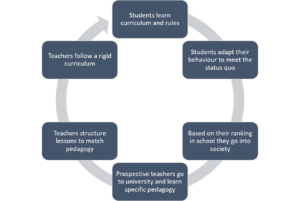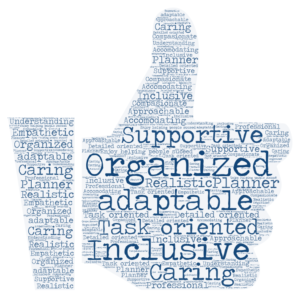Why did you want to go into teaching?

Source: https://webstockreview.net/pict/getfirst
UNBC I completed my undergraduate degree in Biochemistry and Molecular Biology with a minor in Psychology. Afterwards, I was very confused in what I wanted to do for a career. I had started my masters in cancer research and natural product drug discovery, again at UNBC. Quickly, I realized that living a life centered around research and its competitive/output driven nature (at least of the lab I was in), decided that this was not the path for me. I did a lot of self-reflection and realized that the jobs that I have brought me the most joy were centered around teaching and working with youth. So, I applied to work as an educational assistant at a local high school and found myself working in learning assistance and I was sold. The kids, while taking a bit to warm up to me, were fun and wanted to learn. I enjoyed trying to adapt my explanations and ways of teaching so that they all could accomplish their work. This is what truly inspired me to be a teacher.
I before the program I wanted to an educator who is:
Be accessible and adaptable. I have learned through my experiences that not every method of teaching is going to be useful for all students. I want to be adaptable, helpful so that all students can be successful. Also, I am open to learning about what the most profound learning methods are. I found that the linear teaching methods can lead to just regurgitation for a test and not real learning – which I am sure every person can attest to.
Foster critical thinking. As an educator I want to foster critical thinking, questioning, and creativity. Especially in the age of social media I want youth to question that information that they find and not take it at face value. This is one thing that I have learned in my time at university that we really need to evaluate the information we find and understand people’s motive and biases.
Be relevant. I really want to provide practical, meaningful, examples to make learning relevant. The best teachers I have learned from had always given useful examples to help broaden their perspective and that are either meaningful to them. I also want to help find ways in to use technology to either keep them engaged and help them later on in life.
After the first semester, I wanted to add to this list:
Be empathic. I think as an educator, we have to know that our students live difficult lives outside our school. The best way in which I can be a teacher that is accessible, adaptable, relevant and foster creative thinking in context of our ever changing classroom in terms of students and medium (online or in person) is going to be through applying a level of empathy.
What provoked my thinking this semester…
What provoked my thinking the most in EDUC 394 was the concept of gradeless assessment. I had first heard of this during my time working as an educational assistant. I’m not going to lie- I originally thought that it was rather meaningless compared to the letter grade system that I grew up being use to.
What really changed my opinion was two sources that we reviewed in EDUC 394.
- Degrading to De-Grading.
- This article explains that grades induce a level of pressure to preform that can lead students to cheat; resist to learn material that is not testable; and stops them from trying more difficult problems.
- This article also explains that the way in which we produce grades is also incredibly biased. It is dependent on thee way that we write the test, how we mark, and just who you are as a teacher. So the idea of placing such a precise value on a students understanding based on a biased measure does seem like a fair measure of their ability.

Source: https://icon-library.com/tags/logo_1596.html
- Dan Pink’s The Puzzle of Motivation: The Candle Problem.
- Daniel Pink mentioned that reward-based learning is not enough to motivate and can even inhibit a person’s ability to reform a task. This idea of trying to get a reward takes over our ability to think critically. I have experienced this. In high school, I had one math teacher who would put a riddle, puzzle, or word problem on the board. The fastest one to solve the problem would get a candy. But I felt every time I would become flustered and couldn’t really think past the first way I tried the problem.
Overall, these two sources gave me a better insight what the purpose of gradeless assessment was. I now think that gradeless assessment really speak to the pressure that we put on students and how we can change that. I mean, if we are setting up a situation, where students feel a stress to preform (in order to get a competitive GPA for school admission or scholarships) for the extrinsic reward, then we are really creating a situation that inhibits their ability preform the task. So, it makes a lot of sense why students are feeling test anxiety, and maybe even that anxiety is inability to think that was described by Dan Pink.
However, I feel that fundamentally, the effect of giving these grades is opposite to the teachers intent. They want students to succeed and learn. So, this is what really inspired my curiosity into gradeless assessment. I think it could make a more accessible learning environment.
What challenged your thinking?
Previously, I didn’t really think that our school system had anything really wrong with it. Mostly, because I grew up fitting into the expectations that were set out. However, from my experience outside of school and being in the education program, I realized that I couldn’t have been more naïve.
The education system (prior to the curriculum update) was still heavily grounded in the colonial ideals that came in the systems prior to it. This colonial influence lead to expectations of students that controlled the way that they behave and learn. Which in turn lead to students either assimilating to the routine, or being excluded.
One video that was shown this semester that really emphasized this problem was the

Purpose of Schooling by John Gatto. What I understood from this video, was that our school system is stuck in a self-fulfilling prophecy of students learning specific ways of being a, going onto to university to learn to teach the same way they experience, then being bound by a rigid curriculum.
That being said, I feel that the cycle is being broken, and change has began through:
- The new curriculum. I think that is is being taught as a praxis in the new revision of the curriculum. Producing a flexible, changing, moldable set of big ideas that can be implemented in many ways allowing for kids to represent their learning in a meaningful way for themselves rather than in the way that is prescribed by the teacher.
2) Changing teacher education. University’s like UNBC are preparing future educators to teach in a more inclusive, and differentiated way. The implementation of the “pass/fail” course structure has really modeled the way that teaching should go forward in the future. Personally, when this way of grading was presented, I initially felt that internal bias from my previous schooling make me resistant to this kind of assessment. However, what I found over the semester that a pass/fail structure has allowed me to be more open to the idea of learning for the sake of learning, not to get a certain percent on the test. I also felt that this allowed me to explore my interests within the content, whereas before I would have been resistant to extend on my course learning because it wouldn’t be on the test.
I think that this experience has really proven to me the impact that gradeless assessment can have on learning.
What I bring to teaching…

What I wonder about…
How do we get students to buy into gradeless assessment? Using words like “extending” and then comparing it to an “A” or “86%” seems to be counter intuitive. Yet I feel that because it is so engrained in the current system that students will ask for that comparison. I think that there will have to be a real cognitive shift in teachers, kids, and parents in order to get to a point where gradeless assessment becomes second nature.
How can gradeless assessment be fully implemented (where we aren’t making those comparisons) and still translate to university admissions ?
My guiding question into next semester / into my career
How will changing the focus of schooling from “getting good grades” to “learning” through implementation of gradeless assessment impact students mental health?